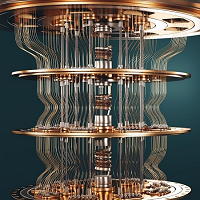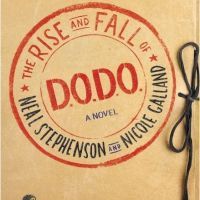Tag Archives: Star Trek
 It’s actually an old debate — in fact, it’s a variation on the Ship of Theseus — but modern day science fiction gives it a new spin. At root it’s a question about exactly where our identity as self-aware conscious beings actually resides. I don’t find it paradoxical so much as intriguing.
It’s actually an old debate — in fact, it’s a variation on the Ship of Theseus — but modern day science fiction gives it a new spin. At root it’s a question about exactly where our identity as self-aware conscious beings actually resides. I don’t find it paradoxical so much as intriguing.
Recently Sabine Hossenfelder jumped into the discussion with a video asking whether Captain Kirk dies every time he uses the transporter. Not just him, of course, but everyone who uses it.
As with trees falling in forests, the answer depends on defining key terms. This case depends on exactly what we mean by “dies” and “Kirk” — the latter being the Ship of Theseus.
Continue reading
16 Comments | tags: Captain Kirk, Sabine Hossenfelder, Star Trek, transporters | posted in Opinion, Science
 Synchronicity pops up a lot in my life. Between working on drafts about my disappointment with a science fiction series, I took a break to read my news feed and saw an article asking why so many popular SF TV series are so awful. The article made a number of points that resonated a lot with me.
Synchronicity pops up a lot in my life. Between working on drafts about my disappointment with a science fiction series, I took a break to read my news feed and saw an article asking why so many popular SF TV series are so awful. The article made a number of points that resonated a lot with me.
The article calls out Westworld (season three), Star Trek: Picard, and Devs, as examples of awful science fiction television, which seems to match what I’ve read. By which I mean, just about everything I’ve heard, both negative and positive, doesn’t incline me towards these shows (I might check out Devs at some point).
Unfortunately, I don’t think the author answered the question.
Continue reading
20 Comments | tags: Gene Roddenberry, science fiction, science fiction TV, SF, Star Trek | posted in Sci-Fi Saturday, TV
 If you know me at all, you know I was already a science fiction fan when Star Trek began. (It’s a rare occasion I get in on the ground floor of something.) I adored Kirk and crew. It took some episodes, but I came to love Picard and crew even more. The Trek story still unfolds, but I left that fold around the fifty-year mark. (Or rather, Trek left me.)
If you know me at all, you know I was already a science fiction fan when Star Trek began. (It’s a rare occasion I get in on the ground floor of something.) I adored Kirk and crew. It took some episodes, but I came to love Picard and crew even more. The Trek story still unfolds, but I left that fold around the fifty-year mark. (Or rather, Trek left me.)
More recently (the rebooted) Doctor Who became my favorite SF TV series, but it’s starting to look like it won’t have the staying power that Trek did. I haven’t been as engaged the last many seasons, and the shift to the 13th Doctor hasn’t worked for me.
Currently I’d have to say my favorite SF TV series is The Expanse.
Continue reading
6 Comments | tags: Boston Legal, Captain Kirk, Chris Chibnall, Dark Matter (TV series), David Tennant, Denny Crane, Doctor Who, Jessi Combs, Jodie Whittaker, Matt Smith, Peter Capaldi, science fiction, science fiction TV, Star Trek, The Doctor, The Expanse (TV series), William Shatner | posted in Sci-Fi Saturday
 Okay, here’s one that’s been sitting in my Drafts folder since 2012. The last time I even edited it was back in 2016. (Wow. Four years ago already?) The problem has been turning it into a post. At this point it’s like a lazy twenty-year-old who won’t move outta the house.
Okay, here’s one that’s been sitting in my Drafts folder since 2012. The last time I even edited it was back in 2016. (Wow. Four years ago already?) The problem has been turning it into a post. At this point it’s like a lazy twenty-year-old who won’t move outta the house.
If you were a serious fan of Star Trek: The Next Generation, the post’s title might ring a bell. It involves an episode with a very interesting idea about a communication problem between different species despite a “universal translator” that makes the words clear.
It isn’t a matter of language, but of metaphor.
Continue reading
9 Comments | tags: Darmok, metaphor, Picard, Star Trek | posted in Sci-Fi Saturday, Writing
 I just finished reading Redshirts, by John Scalzi, and it’s just about the best, most entertaining, brilliant story I’ve read in a good long time. It’s so good that I have to place it with other best-of-kind laugh out loud science fiction delights such as Galaxy Quest and Hitchhiker’s Guide to the Galaxy.
I just finished reading Redshirts, by John Scalzi, and it’s just about the best, most entertaining, brilliant story I’ve read in a good long time. It’s so good that I have to place it with other best-of-kind laugh out loud science fiction delights such as Galaxy Quest and Hitchhiker’s Guide to the Galaxy.
It has a lot in common with Galaxy Quest in being a multi-level utterly ingenious send up and hysterical deconstruction of Star Trek (The Original Series). Scalzi has captured and lampshaded so many of the things fans have discussed over the years. And, as with Galaxy Quest, it’s a pretty good story all on its own.
But it is an absolute must-read for any fan of the original Star Trek.
Continue reading
7 Comments | tags: John Scalzi, science fiction, science fiction books, Star Trek | posted in Books, Sci-Fi Saturday
 Star Trek wasn’t hugely popular right off the bat, or even for a long time. The first series, after all, lasted only three years and had to fight for survival for most of that time. But it did catch on hugely with us fans; many of us fell in love right away.
Star Trek wasn’t hugely popular right off the bat, or even for a long time. The first series, after all, lasted only three years and had to fight for survival for most of that time. But it did catch on hugely with us fans; many of us fell in love right away.
From an early point even within the fan community, let alone to mundanes, some of us were careful to identify as Trekkers rather than Trekkies. As I used to put it, “Trekkers are grown ups who love science fiction. Trekkies own a pair of Spock ears.”
Then, because of a little movie, named Star Wars, science fiction went mainstream. And so did the divide between two rather different kinds of fans…
Continue reading
28 Comments | tags: Bill Maher, Doctor Who, Gamergate, Ghostbusters, Leslie Jones, Marvel comics, SJW, social justice warrior, Stan Lee, Star Trek, Star Wars, The Doctor | posted in Rant, Sci-Fi Saturday, Society
 The other night, I watched the first episode of the CBS reboot of Murphy Brown, and my first thought is that I hope it gets better. A lot better. The only part I liked was the cameo by Hillary Clinton playing “Hillary Clindon,” a potential secretary for Candice Bergen’s Murphy Brown. (If I remember the original show correctly, Brown had a long and troubled history with secretaries, which puts a bit of icing on the scene.)
The other night, I watched the first episode of the CBS reboot of Murphy Brown, and my first thought is that I hope it gets better. A lot better. The only part I liked was the cameo by Hillary Clinton playing “Hillary Clindon,” a potential secretary for Candice Bergen’s Murphy Brown. (If I remember the original show correctly, Brown had a long and troubled history with secretaries, which puts a bit of icing on the scene.)
Seeing the main characters again, for me, was awkward and close to cringe-worthy. They seem very much a product of their era (1988-1998) and didn’t translate well across the two decades that have brought so much social and technical change.
Part of the problem might be that I find CBS half-hour sitcoms tediously dull, cliché-filled, totally unfunny, marshmallow realities.
Continue reading
8 Comments | tags: Big Little Lies, Candice Bergen, Murphy Brown, Patrick Stewart, reboots, Star Trek, Steve Carell, The Office, Will & Grace | posted in Movies, TV
 Come over here. Go over there. Let’s go over the bridge, over the wall, and over the plan (while we still have a roof over our heads). But let’s not get over-confident and allow our enthusiasm to spill over. (For that might over-turn the apple cart and we won’t get a do-over!)
Come over here. Go over there. Let’s go over the bridge, over the wall, and over the plan (while we still have a roof over our heads). But let’s not get over-confident and allow our enthusiasm to spill over. (For that might over-turn the apple cart and we won’t get a do-over!)
Something can be over — that is to say finished, done. And one can be over something (finished with it, done with it). I’ve been struck, lately, by a number of things that are over as well as by the realization that I’m over some things.
The former make me a little bit sad, and a couple of the latter, especially one, took me a bit by surprise!
Continue reading
14 Comments | tags: Anthony DiNozzo, Bernie Sanders, cable news, Castle (TV series), Michael Weatherly, NCIS, Person of Interest, Rizzoli & Isles, Star Trek, Supergirl, The Good Wife, Ziva David | posted in Politics, Society, TV
 I don’t know that synchronicity plays any greater role in my life than it does for anyone else. I seem to notice it fairly often, and I love when it happens. It’s generally an illusion; coincidences occur all the time. Sometimes they stand out in a way seems like evidence of greater import or design.
I don’t know that synchronicity plays any greater role in my life than it does for anyone else. I seem to notice it fairly often, and I love when it happens. It’s generally an illusion; coincidences occur all the time. Sometimes they stand out in a way seems like evidence of greater import or design.
But that is usually a matter of selection bias. Coincidence that impresses us is memorable. Cops, as well as doctors and nurses who work ER shifts, often think the full moon brings out the crazies, but the data doesn’t really support that.
Regardless, synchronicity is fun when it happens.
Continue reading
5 Comments | tags: Captain Kirk, Colonel Klink, David McCallum, Illya Kuryakin, Leonard Nimoy, Leverage, Mr. Spock, Napoleon Solo, Robert Vaughn, Star Trek, The Man From U.N.C.L.E., Werner Klemperer, William Shatner | posted in TV
 The punchline is that I was suddenly struck by how modern fiction seems to have conditioned me to expect an apparent White Hat to secretly be a Black Hat. The question I find myself asking now is whether fiction has actually changed (and if so why) or is it just me? The more I think about it, the more I’m inclined to think modern fiction has changed.
The punchline is that I was suddenly struck by how modern fiction seems to have conditioned me to expect an apparent White Hat to secretly be a Black Hat. The question I find myself asking now is whether fiction has actually changed (and if so why) or is it just me? The more I think about it, the more I’m inclined to think modern fiction has changed.
If so, does that reflect a modern sensibility about people today? Does the rise of the modern anti-hero bring with it the idea of the betrayer? Do we expect so little of people anymore that our heroes need to be dirty and double-agents seem matter of course?
This all started with Diane Duane…
Continue reading
9 Comments | tags: anti-hero, Deep Wizardry, Diane Duane, Ghosts of Mars, High Wizardry, Judas, Manse Everard, Poul Anderson, So You Want to be a Wizard, Star Trek, Star Trek novels, story plots, storytelling, Time Patrol, Weeds, Young Wizards | posted in Books, Sci-Fi Saturday
 It’s actually an old debate — in fact, it’s a variation on the Ship of Theseus — but modern day science fiction gives it a new spin. At root it’s a question about exactly where our identity as self-aware conscious beings actually resides. I don’t find it paradoxical so much as intriguing.
It’s actually an old debate — in fact, it’s a variation on the Ship of Theseus — but modern day science fiction gives it a new spin. At root it’s a question about exactly where our identity as self-aware conscious beings actually resides. I don’t find it paradoxical so much as intriguing. Synchronicity pops up a lot in my life. Between working on drafts about
Synchronicity pops up a lot in my life. Between working on drafts about 

 I just finished reading
I just finished reading  Star Trek wasn’t hugely popular right off the bat, or even for a long time. The first series, after all, lasted only three years and had to fight for survival for most of that time. But it did catch on hugely with us fans; many of us fell in love right away.
Star Trek wasn’t hugely popular right off the bat, or even for a long time. The first series, after all, lasted only three years and had to fight for survival for most of that time. But it did catch on hugely with us fans; many of us fell in love right away. The other night, I watched the first episode of the CBS reboot of
The other night, I watched the first episode of the CBS reboot of  Come over here. Go over there. Let’s go over the bridge, over the wall, and over the plan (while we still have a roof over our heads). But let’s not get over-confident and allow our enthusiasm to spill over. (For that might over-turn the apple cart and we won’t get a do-over!)
Come over here. Go over there. Let’s go over the bridge, over the wall, and over the plan (while we still have a roof over our heads). But let’s not get over-confident and allow our enthusiasm to spill over. (For that might over-turn the apple cart and we won’t get a do-over!) I don’t know that
I don’t know that 












